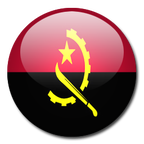International Headteacher
Menu
|
Facts and Statistics
Location: Southern Africa, bordering the South Atlantic Ocean, between Namibia and Democratic Republic of the Congo Capital: Luanda Population: 12,531,357 (July 2008 est.) Ethnic Groups: Ovimbundu 37%, Kimbundu 25%, Bakongo 13%, mestico (mixed European and native African) 2%, European 1%, other 22% Religions: indigenous beliefs 47%, Roman Catholic 38%, Protestant 15% (1998 est.) |
|
Language in Angola
Portuguese is both the official and predominant language in the black, mesti ço and white populations. About 40% of Angolans speak Bantu languages as their first languages, many more as second language, although younger urban generations and some sectors of the Angolan society are moving towards the exclusive use of Portuguese. The most spoken Bantu languages are Kimbundu, Umbundu, and Kikongo (all of these have many Portuguese-derived words). Angolan Society and Culture The Angolan People Although many people when asked may say they are Angolan, most of them will really have their primary sense of identity and loyalty to a tribe. The various tribes and ethnic groups tend to cluster in certain areas of the country each with their own customs, language and history. The major ethnic groups are the Ovimnumdu, the largest, who live predominantly in the central highlands; the Mbundu who cluster around Luanda province; and the Bakongo who live in the northwest provinces. Other large groups include the Nganguela and the Lunda-Chockwe. Religion As you might expect in a country that was a Portuguese colony for over 500 years, the majority of the people are either Christian (Roman Catholic) or follow native beliefs. Most incorporate beliefs such as ancestor worship within a more formal religion. The constitution guarantees freedom of religion. Religious leaders played an important role in the democratic resolution of the civil war and are ardent campaigners for social justice and human rights. Spirit Worship Traditional Angolan religions believe in a close connection with the spirit of dead ancestors. They believe that ancestors play a part in the lives of the living. Therefore, the spirits of dead ancestors remain prominent members of the community. Ancestral worship is a common thread through many indigenous religions. It is considered that not revering the dead can jeopardize the living. It is thought that people must appease the ancestors so that they do not harm the living. It is believed that ancestors can bring famine, plague, disease, personal loss, and other catastrophes. Ancestors are worshiped through ritual performances and ceremonies that often involve the sacrifice of animals. General Etiquette and Customs Meeting People
Gift Giving Etiquette
Meeting and Greeting
Communication Styles Angolan businesspeople are somewhat formal and business communication tends to be restrained. Angolans strive to please others and as a result have a tendency to say what they think the other person wants to hear. It is often difficult to get definite answers to questions, especially if the response would be negative. You may get a ‘yes’ when the answer is actually ‘no’. It is important to watch for evasions or half statements. Rather than accept assurances at face value it may be prudent to ask for specifics so that both sides have the same understanding of what statements mean. Since Angolans prefer to do business with those they know and trust, they spend a great deal of time on relationship building. It is important to devote sufficient time to nurturing a relationship before pressing on to the business at hand. Communication is formal and follows established rules of protocols. Angolans do not interrupt others who are speaking and expect to be afforded the same courtesy in return. Interrupting someone, especially if they are more senior to you in age or position, is a serious breach of etiquette. Angolans use head and arm gestures to emphasize both positive and negative messages and can become very animated at times. Angolans do not require a great deal of personal space when conversing. If you back away, you may give offense or the person may step forward to close the gap. When speaking with someone at your own level, direct eye contact means that you are sincere. When speaking to someone who is senior to you in age or position, indirect eye contact demonstrates respect. In general, women do not make direct eye contact when conversing with men, although this is changing. Business Meetings The first meeting is often used to get better acquainted and business may not be discussed. Angolans prefer to do business with people they know and trust, therefore, the first meeting is often used to determine if you are the type of person with whom they would want to conduct business. This getting-to-know-you conversation is an important part of business and should not be rushed. Meetings are not always as private as they are in many other cultures. In fact, it may appear that there are several meetings taking place in the same room. Agendas are not part of the business culture. If provided, they generally act as a starting point for discussions rather than an itemized list of what will be covered. Attempting to rigidly adhere to an agenda is not recommended, unless you are meeting with the petroleum industry. Meetings have a formal ambiance. It is suggested that you not remove your suit jacket unless invited to do so, as this is seen as too casual. A strong Portuguese influence remains prevalent in Luanda and adhering to such behaviour demonstrates respect to the people with whom you are meeting. Angola related Links and Resources * Currency - the currency of Angola is the Kwanza (AOA). Use the free currency converter to compare to dollars, GBP, etc. * Weather - visit Yahoo!'s up to date Weather for Angola. * Dialling Code - the international dialling code for Angola is +244. * Time - Angola is +1 GMT. |
information provided by www.kwintessential.co.uk

